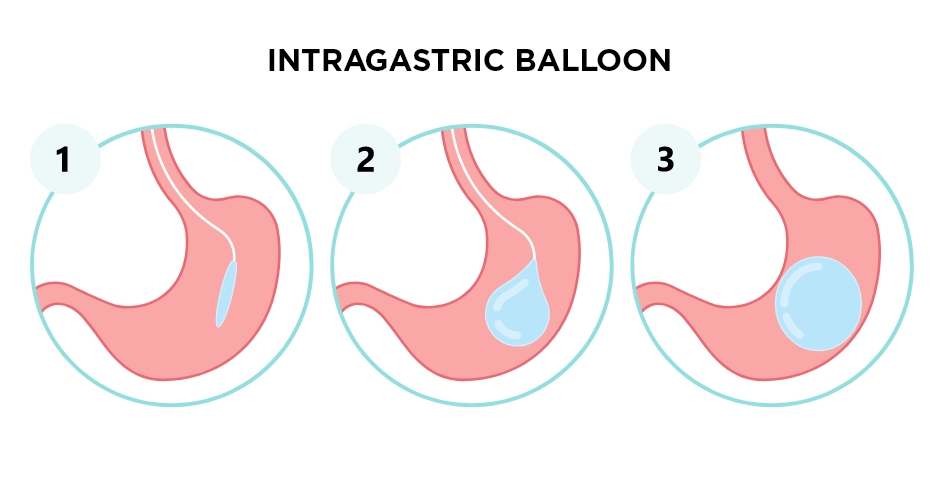
Best Weight Loss Surgery
There are several factors to consider when determining which weight loss surgery procedure is correct for you. The first step is your body mass index (BMI). If your BMI is over 30 you are suitable for the gastric band or ESG (non-surgical sleeve), if it is over 35, you are ideal for either a gastric band, gastric sleeve, gastric bypass, or ESG. For most adults, an ideal BMI is in the 18.5 to 24.9 range, while obesity is categorized as somebody having a BMI over 30. We know that obesity places you at an increased risk of several diseases including heart issues, some cancers, and type 2 diabetes to mention just a few. The impact is that life expectancy is shortened, and the higher your BMI the more your life expectancy is reduced. Clearly, when your BMI gets above 40 the risk to your health conditions goes up very quickly.
You have made the decision to lose weight for a healthy life. However, how do you decide which bariatric procedure is the right one for you? Certain procedures may be ruled out due to your current medical conditions. Therefore, it is very important to tell the bariatric surgeons all about your health, dietary and social patterns. You should also think about your age, lifestyle, eating habits as well as your finances. The Gastric Balloon, Gastric Band, Sleeve Gastrectomy, and Gastric Bypass are all options for weight loss surgery. However, some of these options work harder for you than others. It is important, to be honest, to ask yourself this question: “How much help do I need for weight loss?”
Gastric Balloon
In the gastric balloon procedure, a soft silicone gastric balloon is inserted into your stomach. This balloon partially fills it and imparts a feeling of fullness more quickly after small meals. For this procedure, the balloon is temporary and removed after six months. If you are looking to kick start a new, long-term, healthy diet and lifestyle but you are not ready for a permanent procedure with the associated surgical risks, gastric balloon procedure may be the option for you.
The gastric balloon is suitable for patients with a BMI between 27 and 35 who may not meet the criteria for other bariatric surgery procedures or who are preparing for another surgery that requires a reduced BMI. As gastric balloon fitting is non-surgical it is performed in 15 minutes which means you can go home the same day. As well as being the cheapest weight loss treatment. In addition to being the cheapest weight loss treatment, this weight loss surgery may also be the most appropriate treatment for you.
Gastric Sleeve
Gastric sleeve surgery permanently removes about 75% of your stomach leaving a narrow tube or sleeve. Therefore, you will only be able to eat small meals and feel full for longer after this procedure. In gastric sleeve surgery, the cells with an appetite-promoting hormone (ghrelin) are removed so hunger is also reduced. This surgical alternative offers dramatic weight loss of around 60% of your excess weight.
You might choose this procedure if you have a BMI of 40 or above, you are happy to permanently change your stomach size and you want to lose substantial weight whilst still being able to eat normal food but in smaller portions with food absorption not being influenced negating the worry about nutritional deficiencies associated with a gastric bypass.
Gastric Bypass
In gastric bypass procedure, considered for BMI>35. For weight loss surgery, the gastric bypass is still considered, by many, as the gold standard procedure. but it is also the most intrusive form of Bariatric Surgery. If you have a sweet tooth, are prone to grazing, eat large portions of high-fat foods, and want a power tool then you may wish to consider gastric bypass surgery.
Your weight loss after the operation will be rapid and the downsides of this may be hair loss, problems with excess skin, or nutritional deficiencies. You must be compliant with taking your vitamins or minerals and having your blood monitored regularly (also true with the Sleeve) after the gastric bypass. The gastric bypass procedure offers the highest percentage of weight loss, in the shortest period.
Adjustable Lap Band (ALB)
Adjustable lap band operation involves inserting a silicone band around the upper part of the stomach which decreases the size of the stomach and restricts the amount of food you can eat until you are full. Adjustable lap band is minimally invasive and reversable or adjustable. Adjustments can be made in the doctor’s office for this weight loss procedure.
Lap band operation is often an outpatient procedure. Weight loss is slower than with other weight loss surgical procedures. For the Adjustable lap band, you can expect to lose about 50% of your excess weight in two years and sustain that weight loss over the long term (10 years or more). After the operation, you can expect to be able to eat no more than 3/4ths of a cup of food. If you attempt to eat more, you can become nauseous and vomit.
Biliopancreatic Diversion with Duodenal Switch
The duodenal switch is one of the most complex and least performed weight loss surgeries. The duodenal switch procedure can be very effective in people with a BMI greater than 40. In fact, researchers report that duodenal switch results in more weight loss than gastric bypass. The duodenal switch is also more effective at controlling, and putting in remission, type 2 diabetes and other obesity-related illnesses, compared to other weight loss procedures.

How Much Weight Should I Expect to Lose After Bariatric Surgery?
After the right bariatric surgery for you, weight loss surgery is considered a success if you lose 50% or more of your excess weight over time. At this point, excess weight loss is calculated by subtracting your ideal body weight from your body weight. Each type of weight loss operation is different in terms of the estimated percent of excess weight loss expected and the speed with which the weight comes off. Over the long term, analyses show the following expected weight loss ranges for each type of procedure:
Higher Excess Weight Loss Expected
Gastric Bypass Procedure: 60%–80%
Duodenal Switch Operation: 60%–100%
Lower Excess Weight Loss Expected
Adjustable Lap Band: 10%–80%
Gastric Sleeve Surgery: 40%–80%
Your bariatric team will explain why one of these approaches may be better for you than another, and work with you after weight loss surgery to help you achieve these goals.
The Study of Best Weight Loss Surgery
A recent study published in the New England Journal of Medicine compared the outcomes of various weight loss surgery procedures in a large cohort of patients. The results showed that patients who underwent gastric bypass surgery experienced an average weight loss of 65% of their excess weight within the first two years, with sustained results over the long term. Additionally, the study found that duodenal switch surgery resulted in even greater weight loss, with an average of 75% of excess weight lost within the same timeframe. These findings provide valuable insights for individuals considering bariatric surgery and highlight the effectiveness of these procedures in achieving substantial weight loss.
Conclusion
At Healthy Türkiye, we always recommend that you do plenty of research when considering any form of bariatric surgery. You should think not just about the weight loss but the life changes that will occur because of the surgery. Contact us, pick up the phone with our team, and then arrange to meet with one of our surgeons. This is a great decision with a lifelong commitment. So, make sure that you and our team help you to make the right option.



